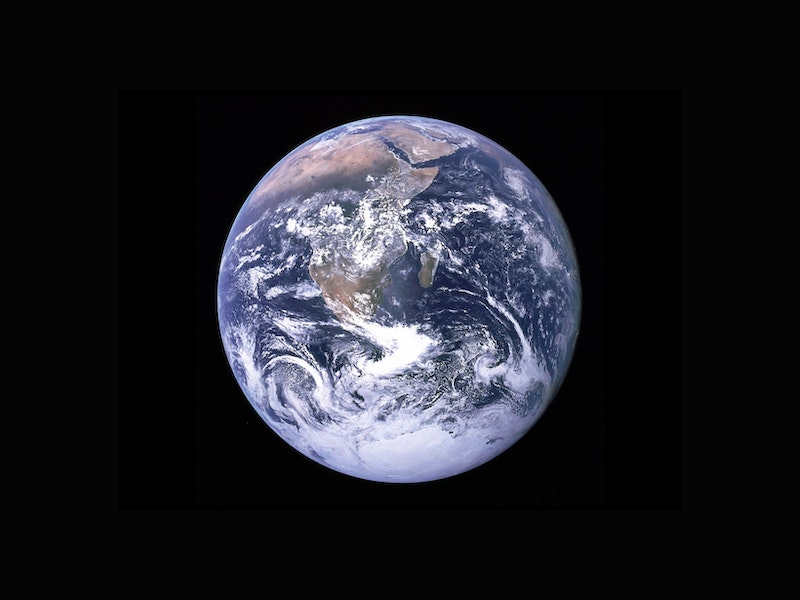Never-ending economic growth on a finite planet creates a profound dilemma
Looking at the Earth in all its majesty reveals an undeniable truth — the physical world around us is finite. That rather obvious fact may not seem to be a big deal, but it has earth-shattering connotations. Economic growth is the core belief of modern society. Achieving growth is the holy grail for governments because a growing economy creates a rising tide that raises all boats. That rising tide equates to more wealth in society. More wealth means higher incomes. Higher incomes provide individuals with a greater ability to consume more, leading to increasing living standards. For capitalism to sustain itself, this process must continue to go on forever, but there are a few issues with the idea of never-ending economic growth.
The first is that economic growth requires ever-increasing throughputs of energy and resources to make more stuff. This linear processing of energy and resources was fine when the economy was small, but now it’s becoming increasingly apparent that throughputs are limited. This rather large elephant reared its head with the publication of The Limits to Growth in 1972. The book argued that if the human population, resource use, and pollution kept increasing on our finite planet, eventually, economies would face environmental limits to growth, precipitating collapse sometime in the twenty-first century.
Limits to growth is fiercely controversial. Even the title of the book is a sacrilegious rebuke that questions the core belief of secular society. Inevitably the backlash against the idea of limits has been ferocious. One of its fiercest critics, the welfare-utilitarian economist Wilfred Beckerman, argued the Limits to Growth study was “guilty of various kinds of flagrant errors of fact, logic and scientific method.”
Beckerman also makes the argument that a failure to maintain economic growth means “continued poverty, deprivation, disease, squalor, degradation and slavery to soul-destroying toil for countless millions of the world’s population.” The argument fails to recognise the inconvenient truth of our environmental reality. Dismissing the evidence and linking more growth to social prosperity is cognitively dissonant. But conventional economists simply have to believe growth can be maintained indefinitely. If economists conceded economic growth on a finite planet isn’t possible, “their position as high priests of the market economy would become untenable.”
The second issue with growth is that the economy is so large that our demands on the natural world exceed its carrying capacity. Earth Overshoot Day symbolises how unsustainable the current state of affairs is. Overshoot day marks the date when “humanity’s demand for ecological resources and services in a given year exceeds what Earth can regenerate in that year.” In 2022, Earth Overshoot Day landed on 28 July. What this means is that we would need 1.7 Earths to make our consumption levels sustainable. And it’s not as if these demands meet the needs of each person. There are billions of people who exist outside of consumer society.
Overshoot is possible — for now — because “we can cut trees faster than they mature, harvest more fish than the oceans can replenish, or emit more carbon into the atmosphere than the forests and oceans can absorb.” The result is that inputs of energy and resources are becoming scarcer, and wastes (like carbon emissions) are having increasing environmental impacts.
Ideas like a zero-growth or a de-growth economy intend to act as missile concepts that dare to think of a development path that doesn’t require economic growth. While there is no specific economic framework envisioning what a zero-growth or de-growth economy would look like, there are a host of policy implications if a transition to such a post-growth economy is realised.
The basis of zero-growth and de-growth concepts is that because developed nations have resource and energy demands far exceeding Earth’s carrying capacity, it’s impossible for developing nations to meet the needs of their people without exacerbating the problem. The richest 20 percent of people account for 80 percent of consumption; the poorest 20 per cent, 1 percent. The only way developing nations can overcome poverty is if developed nations initiate a de-growth process of planned contraction. This would involve developed nations significantly decreasing resource and energy demands. Developing nations can then use some of those resources and energy to meet the needs of their people.
Intentionally degrowing an economy would involve reimagining social success. Rather than life revolving around material success, it would be necessary to “develop new conceptions of human flourishing based on sufficiency, moderation, frugality, and non-materialistic sources of meaning and satisfaction.” Given the evidence that consumerism doesn’t increase social well-being or make people happier, it seems reasonable to suggest that more consumption is not the answer to our problems, but rather it will make social problems associated with consumerism worse.
Another important element would be to decrease inequality. Currently, the richest one percent of people own 46 percent of wealth. We have more than enough to go around, but poverty persists due to a lack of distribution. Redistribution would help to end poverty. The idea is that a “post-growth economy would eliminate poverty and achieve distributive equity not by baking an ever-larger economic pie but by slicing it differently.” Policies that would help distribute wealth include;
- illegalising tax havens where trillions of dollars of wealth are sat in secretive off-shore accounts serving no social purpose
- introducing a universal basic income
- wealth taxes that systematically transfer a percentage of wealth from the richest to the poorest
- a wealth cap, placing a limit on how much wealth any individual can possess
- inheritance taxes of 90% or more to ensure inheritance laws do not create a class system of entrenched wealth and poverty
It’s pretty obvious any kind of radical changes that sought to distribute wealth would be deeply unpopular with powerful vested interests. They would do anything in their power, including, you suspect, resorting to violence, to ensure their status as the wealthiest and most powerful is maintained. Even though maintaining the status quo is to the detriment of all, ultimately, they justify extreme levels of inequality because they are intensely self-serving, greedy and selfish, and enjoy the lavish lifestyles and status that wealth and power provide.
While it’s impossible to sustain economic growth forever, that fact is in direct conflict with our social reality, which depends on never-ending growth to sustain it. To question growth would be to question the foundations of society. The thing is, you can’t just spontaneously redesign society so that it doesn’t grow, but a growing economy can’t also break the rules of nature forever. If economic growth continues to go unquestioned, the economy will continue to grow, overshoot will continue to increase, and environmental impacts will continue getting worse. While there is a refusal to accept the need to give up growth, our impacts on the environment mean we’ll be forced to because as we increase impacts, the likelihood of triggering tipping points in the Earth system increases.
If tipping points are breached, then everything changes. It will become far harder. Crop yields will significantly reduce, leading to food shortages and higher prices. Living standards will drop, and more people will go hungry. When people go hungry, they riot. That’s what happened before the French and Russian revolutions. Historically it’s only in moments of crisis that the fabric of society has weakened and provided revolutionary groups with the opportunity to redesign society in their own image. It seems the only way any such social transformation will be realised now is if a similar breakdown of law and order presents an opportunity to trigger systems change. Revolution is never desirable, but to transform the economy from one that grows to one that doesn’t, it has become necessary. The future of humanity depends on it.



